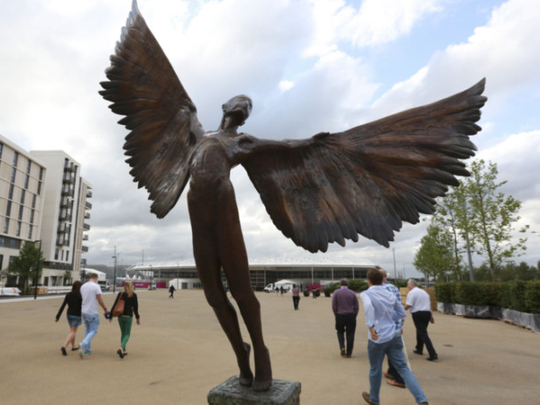
As the final countdown for the London Olympics began a few months ago, the two things that rang in our ears were how budget-conscious this edition of the Games will be and what legacy it will leave for the London public.
The sporting extravaganza that we call the greatest show on earth has always had its share of detractors for the huge financial outlay. But it has continued to hold aspiring cities in thrall over the decades. Tales of how the then British Prime Minister Tony Blair’s famous tea diplomacy won the day for London in July 2005 has now become part of folklore among British media and its citizens.
But that was then, a far cry from July 2012 when the whole of Europe is in the throes of a double-dip recession and Britain is no different, grappling with rising unemployment and costs. No Olympic Games, at least in recent memory, have been able to avoid the inevitability of going over the budget, but the UK government has pulled out all the stops to show that it is on time and under budget.
While a final bill can be produced only after the Games, the government says it is very much within the projected budget of £9.3 billion (Dh53.2 billion) - a figure set in 2007 - as a contingency fund of £476 million was lying ‘unused’ even a month before.
Spiralling costs
Faced with increasing pressure from a parliamentary watchdog committee as well as investigation by the media, which hinted at a spiralling budget because of construction and security costs, the British sports minister Hugh Robertson got down to some serious damage control. It will take some time to realise whether it’s all merely clever financial juggling.
Back in March the Public Accounts Committee estimated that the Olympics was in danger of exceeding its construction and operating budgets, with the total cost to the public purse closer to £11 billion.
However, even if the final budget for London does reach 11 billion pounds, it will still be only half the estimated cost of the 2008 Beijing Olympics, and that’s no mean achievement in itself.
The government has stressed that rather than trying to compete with the huge scale of China’s coming out party, the London Games uses many temporary stadiums that can be reused elsewhere. Even the main Olympic Stadium in Stratford has been designed to have its 80,000 capacity reduced to 25,000.
While the lion’s share of the budget comes from the government, the organisers of the Games, London Organising Committee of the Olympic Games, has raised around £2.1 billion, with £1 billion coming from the International Olympic Committee; £600 million from ticket revenue; £700 million from sponsorship; and £89 million from merchandise sales.
A blueprint for the future
Even after taking the detractors’ views on board, the general perception that friends and colleagues have carried back from recent visits to London is that the Games could provide aspiring countries in the future with a likely blueprint on how to stage cost-effective Games. A major testimony of London’s vision for the Games aimed at leaving a legacy is the Olympic Park in east London, or the Lower Lea Valley. Once seen as one of the most rundown areas in the city and home to heavy industries for the past 400 years, it later became a giant domestic and industrial landfill.
The organisers took on the huge challenge of converting this wasteland into the main venue for the Games — a project that was completed on time and within budget by the summer of 2011. The Olympic Village would offer a total of 2,800 new homes, great news for a city faced with a shortage of real estate.
Whatever stringent efforts may be made to cut costs further, one thing is clear. No modern Olympics can replicate the so-called Austerity Games held in London in 1948, three years after the Second World War, when some teams even brought their own food.
Be that as it may, London, by all accounts, seems to have put its best foot forward to be in sync with these challenging economic times.
As for the rest, it’s now time to get on with the Games.












